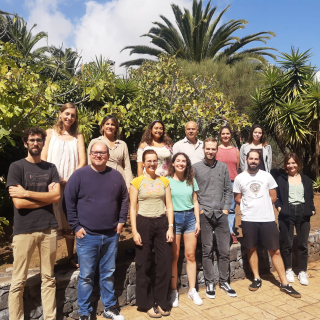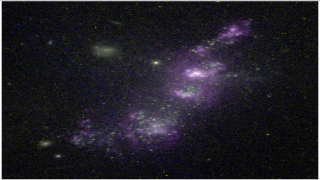Sánchez Almeida, Jorge; Trujillo, Ignacio; Plastino, Angel R.
Bibliographical reference
The Astrophysical Journal
Advertised on:
9
2024
Journal
Citations
10
Refereed citations
4
Description
Unraveling the nature of dark matter (DM) stands as a primary objective in modern physics. Here we present evidence suggesting deviations from the collisionless cold DM (CDM) paradigm. It arises from the radial distribution of stars in six ultrafaint dwarf (UFD) galaxies measured with the Hubble Space Telescope. After a trivial renormalization in size and central density, the six UFDs show the same stellar distribution, which happens to have a central plateau or core. Assuming spherical symmetry and isotropic velocities, the Eddington inversion method proves the observed distribution to be inconsistent with the characteristic potentials of CDM particles. Under such assumptions, the observed innermost slope of the stellar profile discards the UFDs to reside in a CDM potential at a ≥97% confidence level. The extremely low stellar mass of these galaxies, 103–104 M ⊙, prevents stellar feedback from modifying the shape of a CDM potential. Other conceivable explanations for the observed cores, like deviations from spherical symmetry and isotropy, tidal forces, and the exact form of the used CDM potential, are disfavored by simulations and/or observations. Thus, the evidence suggests that collisions among DM particles or other alternatives to CDM are likely shaping these galaxies. Many of these alternatives produce cored gravitational potentials, shown here to be consistent with the observed stellar distribution.
Related projects

Traces of Galaxy Formation: Stellar populations, Dynamics and Morphology
We are a large, diverse, and very active research group aiming to provide a comprehensive picture for the formation of galaxies in the Universe. Rooted in detailed stellar population analysis, we are constantly exploring and developing new tools and ideas to understand how galaxies came to be what we now observe.
Ignacio
Martín Navarro

Starbursts in Galaxies GEFE
Starsbursts play a key role in the cosmic evolution of galaxies, and thus in the star formation (SF) history of the universe, the production of metals, and the feedback coupling galaxies with the cosmic web. Extreme SF conditions prevail early on during the formation of the first stars and galaxies, therefore, the starburst phenomenon constitutes a
Casiana
Muñoz Tuñón